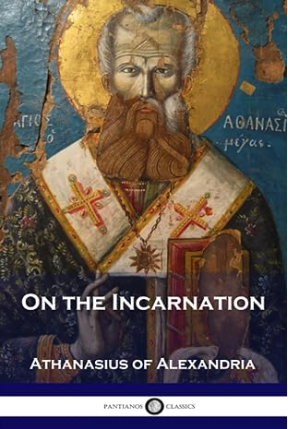On the Incarnation
I asked a well-known theologian of our day a while back what books he would recommend to read. He stated that we need to read the church fathers more (e.g., Athanasius, Irenaeus, Gregory of Nazianzus, etc.). You might be thinking, “I don’t think I can read the church fathers, they are probably too difficult to understand.”

Thankfully, that is not the case. Many of the church fathers were not only faithful in teaching the scriptures, they were excellent summarizers of big theological concepts. On the Incarnation by Athanasius is roughly 60 pages long. He was a very clear and concise writer.
Athanasius’ work on the incarnation of Jesus is a great summary of a Christian doctrine that not only is biblical, but also is a vital component to the Christian faith. In order to understand this doctrine of the incarnation, Athanasius takes us all the way back to creation.
The incarnation is seen as a recreation, which is why starting at the beginning is necessary. Athanasius states, “Recreation was accomplished by the Word who created it in the beginning. For it will appear not at all contradictory if the Father works its salvation in the same one by whom he created it” (p. 50).
One of the things that stood out to me the most in this work was the emphasis Athanasius put on the goodness of God. I know that God is good and just, but I always had the notion that when dealing with the fall in the garden, it would have been right and fair for him to end it all right then and there.
Justice would have been served. But Athanasius points out the goodness of God in creating image-bearers. “For God has not only created us from nothing, but also granted us by the grace of the Word to live a life according to God” (p. 50).
He goes on to say, “For these reasons, then, with death holding greater sway and corruption remaining fast against human beings, the race of humans was perishing, and the human being, made rational and in the image, was disappearing, and the work made by God was being obliterated” (p. 51).
Therefore, Athanasius makes a compelling argument that the goodness of God seen in the creation of humans is what drives the desire to save his creation, whom he calls good.
This is done through the loving condescension of the Son, “having mercy upon our race, and having pity upon our weakness, and condescending to our corruption, and not enduring the dominion of death, he takes for himself a body…For he did not wish simply to be in a body, nor did he wish to merely appear…” (p. 57). Athanasius helps us see clearly that the incarnation is “for us and our salvation.”
I echo that theologian's advice; let us read the church fathers in order to see what Christians have believed (and still believe) for a very long time. On the Incarnation by Athanasius is a great place to start.
More in Monthly Newsletter
May 1, 2024
The Christian Ethic of Joy and SufferingMay 1, 2024
Elders ReportMay 1, 2024
Deacons Report